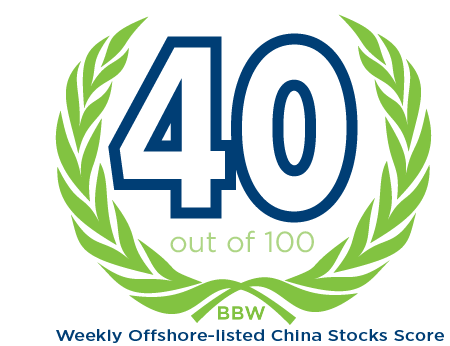CHINA BULLETIN: Moody’s Downgrades China Outlook


In this week’s issue a Moody’s downgrade, a China-EU summit, and Evergrande dodges a meltdown. On a scale of 1 to 100, we give the week a 40 for offshore-listed China stocks.
Doug Young, Editor in Chief
You can sign up to get China Bulletin weekly in your inbox.
MACRO
Moody’s Downgrades China Outlook
The biggest story last week was Moody’s downgrade of its outlook on China’s credit rating to “negative” from “stable.” Such downgrades don’t guarantee an actual lowering of a country’s actual credit rating, but signal such a move could come. In this case many believe China will soon have no choice but to help many of its struggling companies and local governments.
Beijing’s reaction was surprisingly muted, with the Finance Ministry calling the move “disappointing.” Perhaps expecting the worst, Moody’s also reportedly told its Chinese employees to work from home the day of the announcement. Moody’s may be worried by China’s recently announced plan to issue 1 trillion yuan, or about $137 billion, in sovereign debt to support local governments.
EU Comes Calling on Beijing
We often write about China-U.S. relations, but last week the big foreign relations news came from the first meeting between Chinese and EU leaders since the pandemic. The list of topics discussed at the Beijing summit included many evergreens like China’s call for less confrontation. But the EU was having none of that, making very clear it wants to reduce its trade deficit with China.
In another development from Europe, Italy formally announced it was withdrawing from China’s signature Belt and Road Initiative (BRI). This move was as much about a change of leadership in Italy as it was about growing indifference towards BRI in the west, which sees the program as a propaganda ploy at best and a way to saddle developing countries with big debt at worst.
China Stocks Sag Under Moody’s Downgrade
Offshore-listed China stocks extended their skid for a second consecutive week, as the Moody’s downgrade dominated the headlines and fueled concerns about China’s economy. The Hang Seng China Enterprises Index fell 2.8% during the week, while the iShares MSCI China ETF lost 4.4%, and the broader Hang Seng Index fell 2.9%.
Adding in declines from the previous week, offshore China stocks have now fallen between 5% and 7% over the last two weeks. Markets got a slight shot of good news later in the week when Chinese exports returned to positive territory for the first time in six months. But the Moody’s downgrade, combined with lack of positive noise from the China-EU summit, dominated broader sentiment.

Industry
Exports Return to Growth Track
Last week’s broader gloom got a brief reprieve when the latest foreign trade data showed an unexpected revival for China’s manufacturing sector, which powered exports to their first growth in the last six months. But the growth wasn’t exactly impressive, with exports up just 0.5% in November from a year ago. Imports continued to stumble, dropping 0.6% for the month.
Analysts had been expecting just the opposite, forecasting a small drop in exports and a 3.3% rise in imports, which had previously risen in October. But lest anyone get too excited, China’s official purchasing manager’s index showed export orders decreased for a ninth consecutive month in November, meaning the latest export rise could possibly be just a statistical blip.
Home Inventory Builds in Smaller Cities
New data is showing what most people who follow China’s ailing property sector already know, namely, that the problem is much worse in smaller cities than major metropolises like Beijing and Shanghai. According to the China Index Academy, new homes in China’s third- and fourth-tier cities took an average of 26.3 months to sell at the end of October – or more than two years.
The time needed to sell an average home in top-tier cities like Beijing or Shanghai was 12.7 months at the end of October, or about half the level of smaller cities. Such long wait times are inevitably putting huge pressure on prices, since many sellers may not be able to wait for such long periods and thus will lower their prices to attract a buyer more quickly.
Bring on the International Travelers
China has given some data that shows its new policy allowing visa-free stays of up to 15 days for citizens of five European countries and Malaysia may be having some positive effect at restarting international travel that dived during the pandemic. About 7,000 of the nearly 18,000 travelers from the six countries to enter China in the first three days of December took advantage of the policy.
The policy only took effect Dec. 1, so it’s probably safe to say that most of the 7,000 people who took advantage of it were already planning trips to the country before the policy was announced in late November. Still, it’s an encouraging sign, especially considering the difficulty many people have talked about in obtaining visas to come to China post-pandemic.

Company
Evergrande Kicks Liquidation Can Down the Road
Just when it looked like it might be forced to liquidate, embattled developer Evergrande has once again managed to kick the can of this increasing inevitability down the road by nearly two months. A Hong Kong judge was set to possibly order the company’s liquidation at the start of last week, but gave it until Jan. 29 to finalize a restructuring plan for its offshore debt.
We suspect the Hong Kong judge was under huge pressure to delay this ruling, since a forced liquidation could have set off a chain of events with disastrous consequences. It’s quite possible Evergrande could ultimately get some help from Beijing, which is reportedly preparing a list of “too big to fail” developers that could receive government assistance.
Honda Cuts Jobs at China Venture
Japanese carmaker Honda passed a dubious milestone last week when its main China joint venture implemented its first job cuts since entering the market 25 years ago. GAC Honda announced it was cutting 900 jobs, equal to about 7% of its 12,600 workers at the end of 2022.
Honda and other makers of traditional gas-powered cars have been losing market share to companies more focused on new energy vehicles (NEV) that are being strongly supported by Beijing. GAC Honda’s sales have been declining since 2021, including a 3% drop that year and another 5% fall in 2022.
Wanda Loses Control of Cinema Business
He once likened his Wanda Group to Disney, as Wang Jianlin sought to build up a Chinese version of the global entertainment giant with operations spanning filmed entertainment to theme parks. But these days Wang is watching that empire slip away with slower consumer spending and pressure on Wanda’s core real estate business.
In Wang’s latest setback, Wanda announced it was selling 51% of Wanda’s cinema business to a subsidiary of China Ruyi Holdings, a filmed entertainment producer that’s controlled by Tencent. This move isn’t all that surprising, since China’s theater industry hasn’t been doing all that well these days after briefly passing the U.S. to become the world’s biggest box office.
AND FROM THE PAGES OF BAMBOO WORKS
| PDD Takes E-Commerce Crown from Alibaba Last week we bought you the story of the latest major milestone for rising e-commerce star PDD, which officially overtook Alibaba to become China’s most valuable e-commerce company. PDD, better known in China as Pinduoduo, made the leap on the back of a 17% jump in its shares after releasing new financial data showing its revenue nearly doubled in the third quarter. PDD has made its name by offering incredibly low prices and adding a social group buying element to its service, which is targeted at China’s most price-sensitive smaller cities. But the big story behind its revenue jump was the explosive growth for its Temu service, which it launched just over a year ago to target global markets. |
| Two Crypto Companies Jump on AI Bandwagon We also brought you the story of two crypto companies with Chinese roots, Bitdeer and Canaan Inc., which are trying to hedge their bets against bitcoin volatility. In a very Chinese story, the two companies are making that diversification drive with different new initiatives in the hot area of artificial intelligence. Bitdeer, which operates a crypto trading platform, said it will buy AI-powered chips from Nvidia for use in a new cloud center it will operate. Meantime, Canaan, which makes crypto mining machines, revealed it will use its own chip expertise to make chips for AI applications. The pair of companies could also get some help from a recent rally in actual crypto markets. |






